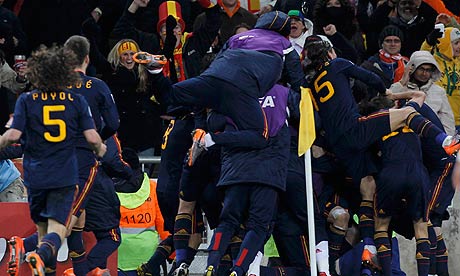After a World Cup final of so toxic a nature the stadium is in need of decontamination more than the regular clean-up. To Spain comes rightful glory as they took this prize for the first time. The side prevailed over a Holland team that was reduced to 10 men when the English referee, Howard Webb, eventually dismissed the defender John Heitinga, with a second caution in the 109th minute. Cesc Fábregas, on as a substitute, fed Andrés Iniesta to score the winner seven minutes later.
Holland were already being rebuked prior to the final but these events were on a wholly different scale and Fifa should take additional action considering the harm done to the culmination of a tournament that means so much around the globe. The losers were overwhelmingly the guiltier party, with seven bookings, not including Heitinga's pair. Spain's count climbed to five with late cautions for Xavi and Iniesta near the end.
Repellent as many of the events were, talent insisted on creeping in and Spain both manufactured and misused a rising number of opportunities, particularly in extra-time. As it is, all four of their matches in the knockout phase have been won by the same 1-0 score. The Euro 2008 title, too, came with that result. In Johannesburg the frustration while waiting for the breakthrough was vast. An unbeaten run of 25 matches came to an end for Holland but it would have been better for their reputation had they lost earlier instead of tying themselves to this notoriety.

It would still be a misrepresentation to state that Holland devoted themselves entirely to wrong-doing and, in the 82nd minute, Arjen Robben was denied by an Iker Casillas save at his feet. No one can deny, though, that the victors are entitled to the prize. This occasion might bear less infamy if only they had scored earlier. As results show, chance-taking is the sole defect. The right-back Sergio Ramos, for instance, put a free header high from a corner kick in the 77th minute. The side's wastefulness was glaring, too, in extra-time.
Still, they are to be excused for any sense of disorientation. The mayhem and nastiness of the occasion were encumbrances for Spain, who would have envisaged a wholly different type of game. It was potentially unsettling that this victory in the World Cup could be seen as their destiny considering that they had never even reached the final before. Vicente del Bosque's side, for that matter, have developed a highly individual style founded on exceptional technique that exhausts and demoralises opponents as a midfield of supreme artistry confiscates the ball.

The flaw lies in the fact that possession can be an end in itself for Spain. European champions though they might be, the team began their World Cup programme in South Africa with defeat by Switzerland. They went behind then and a single goal sufficed for the victors. That occasion must have been prominent in the thoughts of the coach, Bert van Marwijk, and the Holland players. It can certainly be agreed that adversity of another sort lay before Spain in Johannesburg.
There had been an expectation that the Dutch would be much less respectful than the young Germany side that lost to Spain in the last four. Holland have a hard-bitten air and Mark van Bommel, the defensive midfielder, is utterly at peace while making enemies. Even so, no one anticipated this extreme conflict. Webb might well have shown Van Bommel a red card before the interval but was most likely trying to bring about some semblance of calm.
The standard medals for the officials should be seen as awards for a hazardous peace-keeping mission. Four bookings in the opening 22 minutes did not get the attention of players, particularly those of Dutchmen with their minds on anarchy.
Nigel De Jong took up old habits unacceptably later in the first half but escaped with a yellow card after landing his studs in the chest of Xabi Alonso.
The midfielder was unscathed but Spain had a fragility of sorts. Fernando Torres, out of form since a knee injury in March, did not come off the bench till near the close and, without him, the lack of a finisher is unmistakable. All the same, Ramos did connect with a Xavi set piece after four minutes and Maarten Stekelenburg was fully extended to parry to his right.
The subtler aspects of open play were generally forgotten. Spain, as anticipated, had more polish but the final assuredly did not gleam. Whatever was said at half-time did not lead to the players changing their ways. Before an hour was completed it had been necessary for Webb to caution Holland's Giovanni van Bronckhorst. Despite being captain, veteran and cultivated left-back, not even he was above the ugliness.
The tone might have altered swiftly with a goal that looked likely in the 62nd minute. Wesley Sneijder suddenly introduced artistry with a lovely pass that put Arjen Robben clear of Spain's defence and the winger attempted to take care, yet Casillas got his right leg in the path of the parting shot and conceded merely a corner.
It was a spell in which the Dutch were in the ascendancy. The better moments made it all the more infuriating that Webb still had to keep reaching for his yellow card. For convenience sake he would have been as well keeping it in his hand at all times. There were only three players from the Holland starting line-up who were not cautioned: Stekelenburg, Dirk Kuyt and Sneijder.
Whatever sanctions may lie ahead, Spain at least punished them by claiming the World Cup.
by guardian.co.uk













